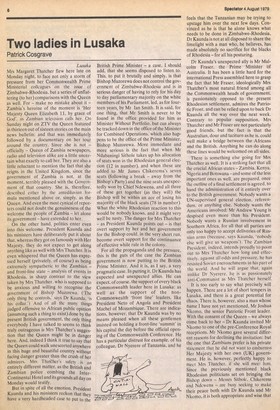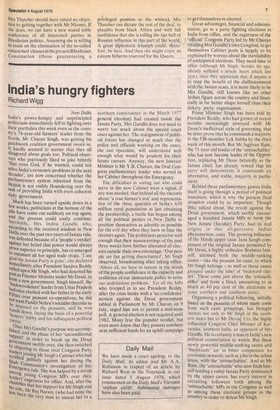Two ladies in Lusaka
Patrick Cosgrave
Lusaka Mrs Margaret Thatcher flew here late on Monday night, to face not only a storm of pressure from her Commonwealth Prime Ministerial colleagues on the issue of Zimbabwe-Rhodesia. but a series of unflattering (to her) comparisons with the Queen as well. For — make no mistake about it — Zambia's heroine of the moment is 'Her Majesty Queen Elizabeth 11. by grace of God'. as Zambian television calls her. On Sunday night on ZTV the Queen featured in thirteen out of sixteen stories on the main news bulletin: and that was immediately followed by a documentary on her tour around the country. Since she is not — officially — Queen of Zambia newspapers, radio and television alike are a little uncertain what exactly to call her. They are also a little reluctant to mention the fact that she reigns in the United Kingdom, since the government of Zambia is not, at the moment, terribly pleased with the Government of that country. She is, therefore, described either by the antediluvian tinmula mentioned above or, simply. as the Queen. And even the most cynical of reporters could not doubt the genuineness of the welcome the people of Zambia — let alone its government — have extended to her.
On the other hand, politics enter even into this welcome, President Kaunda and his ministers have deliberately put it about that. whereas they got on famously with Her Majesty, they do not expect to get along anything like as well with Mrs Thatcher. It is even whispered that the Queen has expressed herself (privately, of course) as being extremely sympathetic to the Zambian — and front-line state — analysis of events in Rhodesia. in sharp contrast to the view taken by Mrs Thatcher. who is supposed to be anxious and willing to recognise the government of Bishop Muzorewa, ("The only thing he controls, says Dr Kaunda, 'is his collar.') And of all the many things judged offensive to African public opinion (assuming such a thing to exist) done by the present British government, the only thing everybody I have talked to seems to think truly outrageous is Mrs Thatcher's suggestion that the Queen might be in danger here. And, indeed I think it true to say that the Queen could walk unescorted anywhere in this huge and beautiful country without facing danger greater than the crush of her admirers. Mrs Thiaher's safety is an entirely different matter, as the British and Zambian police combing the InterContinental Hotel and its grounds all day on Monday would testify.
But in spite of all the emotion. President Kaunda and his ministers reckon that they have a very hardheaded case to put to the British Prime Minister — a case, I should add, that she seems disposed to listen to. This, to put it brutally and simply, is that Bishop Muzorewa does not control the government of Zimbabwe-Rhodesia and is in serious danger of having to rely for his day to day parliamentary majority on the white members of his Parliament, led, as for fourteen years, by Mr Ian Smith. It is said, for one thing, that Mr Smith is never to be found in the office provided for him as Minister Without Portfolio, but can always be tracked down in the office of the Minister for Combined Operations.' which also happens to be the office of the Prime Minister. Bishop Muzorewa, More immediate and more serious is the fact that when Mr Ndabaningi Sithole takes up his allocation of seats won in the Rhodesian general election (12 in number). and when these are added to Mr James Chikerema's seven seats (following a break — away from the Bishop's Party) and the nine seats unexpectedly won by Chief Ndewena, and all three of these get together (as they will) the Bishop will be within an ace of losing his majority of the black seats (78 in number). What the white Rhodesian reaction to this would be nobody knows, and it might very well be nasty. The danger for Mrs Thatcher — as President Kaunda points out — is that overt support by her and her government for the Bishop could. in the very short run, become overt support for the continuance of effective while rule in the colony.
For all the propaganda and the pressure, this is the guts of the case the Zambian government is now putting to the British Prime Minister. And it is, as I say. a very pragmatic case. In putting it, Dr Kaunda has expected and unexpected allies. He can expect, of course, the support of every black Commonwealth leader here in Lusaka: as well as the support of the nonCommonwealth 'front line' leaders. like President Neto of Angola and President Machel of Mozambique. There are indications, however, that Dr Kaunda was by no means pleased when all these gentlemen insisted on holding a front-line 'summit' in his capital the day before the official opening of the Commonwealth Conference. He has a particular distrust for example, of his colleague, Dr Nyerere of Tanzania, and he feels that the Tanzanian may be trying to upstage him over the next few days. Convinced as he is that he alone knows what needs to be done in Zimbabwe-Rhodesia, Dr Kaunda is not at all disposed to share the limelight with a man who, he believes, has made absolutely no sacrifice for the blacks of Rhodesia — for all his posturing.
Dr Kaunda's unexpected ally is Mr Malcolm Fraser, the Prime Minister of Australia. It has been a little hard for the international Press assembled here to grasp the fact that Mr Fraser, ideologically Mrs Thatcher's most natural friend among all the Commonwealth heads of government. is passionately opposed to the present Rhodesian settlement, admires the Patriotic Front. and can be relied upon to back Dr Kaunda all the way over the next week. Contrary to popular supposition. Mrs Thatcher and Mr Fraser are not particularly good friends, but the fact is that the Australian. dour and taciturn as he is, could well make a bridge between the Africans and the British. Anything he can do along these lines would be welcomed on all sides.
There is something else going for Mrs Thatcher as well. It is a striking fact that all the crucial African states — Zambia, Kenya. Nigeria and Botswana and some of the less important ones as well, are prepared, once the outline of a final settlement is agreed, to hand the administration of it entirely over to the British government. Nobody wants a UN-supervised general election, referendum. or anything else. Nobody wants the Americans involved: Mr Andrew Young is despised even more than his President. Nobody wants a Russian involvement in Southern Africa, for all that all parties are only too happy to accept deliveries of Russian arms (because, says Kaunda, 'nobody else will give us weapons'). The Zambian President, indeed, intends proudly to point out to Mrs Thatcher how long and effectively, against all odds and pressure, he has resisted Soviet encroachments in his part of the world. And he will argue that, again unlike Dr Nyerere, he is as passionately anti-Communist as Mrs Thatcher herself.
It is too early to say what precisely will happen. There are a lot of short tempers in Lusaka, and there is a great potential for chaos. There is, however, also a man whose name I have not yet mentioned, Mr Joshua Nkomo. the senior Patriotic Front leader. With the consent of the Queen — we always come back to her — Dr Kaunda invited Mr Nkomo to one of the pre-Conference Royal receptions. Mr Nkomo gave several different reasons for declining the invitation: but the one that Zambians prefer is his private statement that he did not want to embarrass Her Majesty with her own (UK) government. He is, however, perfectly happy to meet Mrs Thatcher, if she will meei him. Since the previously mentioned black Rhodesian politicians set on bringing the Bishop down — Messrs Sithole, Chikerema and Ndewena — are busy seeking to make their peace both with Dr Kaunda and Mr Nkomo, it is both appropriate and wise that Mrs Thatcher should have raised no objection to getting together with Mr Nkomo. If she does, we can have a new round table conference of all interested parties in Rhodesian politics. Assuming she is willing to insist on the elimination of the so-called entrenched clauses in the present Rhodesian Constitution (those guaranteeing a privileged position to the whites), Mrs Thatcher can dictate the rest of the deal, to plaudits from black Africa and with full confidence that she is tolling the last bell of Russian influence in this part of the World. A great diplomatic triumph could, therefore, be hers. And then she might enjoy an esteem hitherto reserved for the Queen.



































 Previous page
Previous page